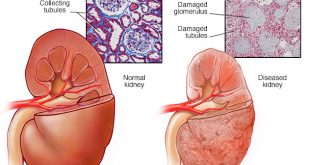Introduction
As a hemodialysis patient, you want to learn all you can about your treatment and what you can do to maintain your health at its best. One important area you should know about involves infectious diseases. These are diseases that happen when harmful germs get into your body and make you ill. Kidney failure interferes with your body’s natural immunity, making it easier for you to get some types of diseases like hepatitis or AIDS through your dialysis treatments.
Some facts about hepatitis B
What is hepatitis B?
Hepatitis B is a virus infection that causes liver disease. Most people fight off this infection themselves, but up to 10 percent progress to chronic liver disease and possibly liver cancer. Hepatitis B is spread by contact with the blood and body fluids of an infected person.
You may have an increased chance of getting hepatitis B if you:
- have sex with an infected person
- inject illegal drugs
- live with an infected person and share items such as razors and toothbrushes with the person
- have been exposed to sharp instruments contaminated with infected blood, such as needles used for tattooing, body piercing and acupuncture (these needles should be carefully cleaned and disinfected before use, or disposable needles should be used)
- have hemophilia through multiple blood transfusions.
In addition, a baby can get hepatitis B from an infected mother during childbirth.
Could I get hepatitis B through my dialysis treatment?
In the early years of dialysis, there was a danger of getting hepatitis B through exposure to the blood of an infected person at the dialysis unit. However, today the chance of getting hepatitis B through your treatment is very small because of two important advances. One of these advances is the use of strict infection control measures in dialysis units. The second improvement is the availability of a vaccination for hepatitis B. In Malaysia, patients with Hepatitis B are dialyzed in a segregated room with dedicated nursing staff.
Can I get hepatitis B from a transfusion?
The chances are very small. All donated blood is screened carefully for hepatitis B as well as other blood-borne infections, such as hepatitis C and HIV.
How do you know if you have hepatitis B?
The only way to tell for sure is to have a blood test. Most people who get hepatitis B have no symptoms at all.
However, some people may have flu-like symptoms especially in the early phase of infection including:
- loss of appetite
- nausea or vomiting
- fever
- extreme tiredness
- stomach or joint pain
In addition, you may have yellowing of the skin or eyes.
Some people may become carriers of hepatitis B, which means they have no symptoms but can still infect others with the disease. The carrier state may last for years or even for life. Some carriers may eventually develop scarring of the liver, liver failure or liver cancer.
Are there treatments for hepatitis B?
Yes. Two drugs have been approved for the treatment of chronic hepatitis B. These are interferon alpha-2b and lamivudine. These drugs should not be given together. Overall, about 35 percent of patients treated with injections of interferon for four to six months will have a long-term response. The response to oral lamivudine, given for at least one year, may be somewhat lower. Lamivudine is very well tolerated, but viral resistance to treatment may occur. Interferon therapy often results in loss of appetite, depression and hair thinning.
These treatments are initiated by the liver specialists. Hence, you will need to be referred and be reviewed by them.
How can hepatitis B be prevented?
One of the best ways to prevent hepatitis B is to be vaccinated. Hepatitis B vaccination is recommended for all children (including adolescents and teens) and hemodialysis patients and staff. The vaccine works by causing your body to make special proteins called antibodies that protect you against hepatitis B. Your response to the vaccine depends on your age, other medical conditions you may have and your general state of health, but most people will make enough antibodies to protect them against the disease. If you are vaccinated, your dialysis care team will check your blood periodically to make sure enough antibodies are present. If you have not yet been vaccinated, ask your dialysis staff about the vaccination.
You can also help to prevent hepatitis B by following safe sex guidelines and by avoiding high-risk behaviors such as injecting illicit drugs.
Is the vaccination safe?
Yes. The vaccines are made from baker’s yeast and contain noninfectious particles called antigens. You cannot get viral hepatitis from the vaccination. These vaccines have undergone extensive clinical testing and have been used by millions of people worldwide with few side effects. However, people with acute illness or a known allergy to yeast should not be vaccinated.
| Last Reviewed | : | 12 May 2016 |
| Writer | : | Dr. Loh Chek Loong |
| Accreditor | : | Y. Bhg. Datuk Dr. Ghazali bin Ahmad |
 PENDIDIKAN PESAKIT Kementerian Kesihatan Malaysia
PENDIDIKAN PESAKIT Kementerian Kesihatan Malaysia
